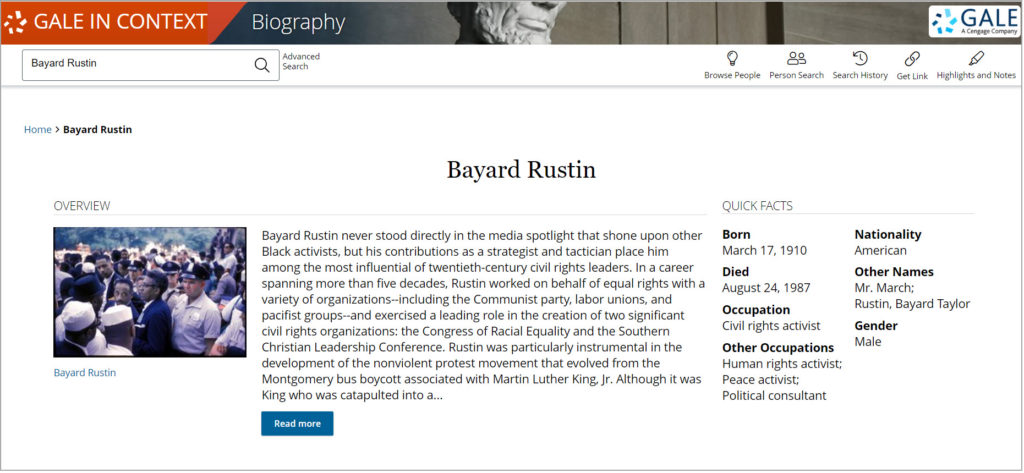| By Carol Brennan |
February is Black History Month, and one of Gale In Context: Biography’s family of reference titles, Contemporary Black Biography, has been delivering in-depth profiles of global leaders in politics, the arts, sports, and other fields of achievement for nearly 30 years. An incomparable resource for students, teachers, and all lifelong learners, Contemporary Black Biography is updated quarterly with timely articles on a range of figures, from high-visibility activists to social justice warriors who have been quietly working behind the scenes for decades.
For Black History Month 2022, we’re honored to highlight some of the most courageous activists in recent years, who carry forward the legacy of previous generations. On the literal front lines of organized mass demonstrations are the three women credited with launching #BlackLivesMatter protests: Alicia Garza, Opal Tometi, and Patrisse Cullors. Garza has been active in the labor movement for domestic workers; Tometi is involved in immigration issues; and Cullors advocates on behalf of policing reform. Their efforts hearken back to the dedicated and often dangerous work done by Ella Baker, who founded the Student Nonviolent Coordinating Committee in 1960. Baker worked closely with Bayard Rustin, whom Rev. Dr. Martin Luther King Jr. entrusted to organize the 1963 March on Washington for jobs and freedom.

Dr. King’s namesake father, the Baptist minister Martin Luther King Sr., was a key figure inside the Atlanta chapter of the National Association for the Advancement of Colored People (NAACP), founded in 1909 by the historian and writer W. E. B. Du Bois. The elder King was an ally of two lesser-known Atlanta activists, John Wesley Dobbs and A. T. Walden, who organized a remarkably successful voter registration drive in their hometown at the height of the Great Depression in the 1930s. Dr. King’s economic justice initiative, the Poor People’s Campaign of 1968, was revived in 2017 by the Rev. William Barber II, who rose to prominence in 2015 following the mass shooting of nine Black Americans in a Charleston, South Carolina, church.
Reverend Barber’s campaign for economic justice for twenty-first-century Black Americans relies in part on the numbers—the cold, color-blind revelations of data that demonstrate how vast the racial gap remains in 2022. Other unassailable truths have come to light in recent years through the work of gifted academics, like Michelle Alexander, author of The New Jim Crow: Mass Incarceration in the Age of Colorblindness. The revelations in Alexander’s scholarship chime with the work of her peer Bryan Stevenson, founder of the Equal Justice Initiative. Both of their efforts have been amplified by the writer Ta-Nehisi Coates, whose 2014 essay, “The Case for Reparations,” in the Atlantic chronicled with a devastating precision the impact that decades of racial bias continues to have on the lives of nearly 47 million Black Americans.
Black History Month 2022 offers Americans the opportunity to honor and mourn the men, women, and children whose lives ended violently due to systemic oppression. They range from vivid firebrands like Malcolm X, who urged radical measures, to Breonna Taylor, the Louisville, Kentucky, woman awakened and felled by police gunfire inside her home. Neither Emmett Till, a teenager lynched in Mississippi in 1955, nor quiet souls like George Floyd of Minneapolis; Michael Brown of Ferguson, Missouri; or Florida’s Trayvon Martin could have imagined that their deaths would send millions to the streets to protest racial injustice in America, yet their names are nestled inside the thousands of entries in Contemporary Black Biography and Gale In Context: Biography. “I had no idea that history was being made,” said Rosa Parks, the Montgomery, Alabama, seamstress who put herself in physical danger one December day in 1955, in an act widely viewed as the starting point of the U.S. civil rights movement of the twentieth century. “I was just tired of giving up.”
Check back here every Monday this month to read more about some of the most remarkable influencers featured in Gale In Context: Biography.
Not a Gale In Context: Biography subscriber? Learn more about this authoritative database >>

About the Author
Carol Brennan has been writing biographical entries for Cengage/Gale since 1993. If she’s not writing, she is either at yoga or walking her dachshund. Carol consumes an alarming volume of podcasts and audiobooks weekly.

